The spirit of giving doesn’t depend on the season. However, when Giving Tuesday comes around every year, scammers are quick to jump on that bandwagon. They exploit generosity, posing as legitimate charities or creating entirely fake ones to steal money and personal information. Their tactics change, but the goal never does: To take advantage of your kindness.
Before you donate, take a moment to make sure your contribution is going where you intend. A little caution goes a long way toward protecting both your wallet and your identity.
Do your homework first
Spend a few minutes researching any charity before handing over money or personal details. Reputable organizations clearly share their mission, how donations are used, and how to verify their legitimacy.
Be cautious with door-to-door solicitors
If someone shows up claiming to collect money for a cause, don’t donate on the spot. Ask for printed information or a website, then look into the organization yourself. A legitimate charity won’t pressure you to give immediately.

Verify their story—independently
If a fundraiser says they represent a specific organization, call the charity directly using a phone number you find on your own, not one provided by the solicitor. This applies to phone calls and emails, too. Unsolicited contact should always be treated with skepticism.
Avoid cash donations
Use a payment method that provides a record, such as a credit card. Keep documentation of any donation so you can dispute charges or report scams if needed. Never send gift cards, wire transfers, cryptocurrency, or prepaid cards.
These payment types are favorites of scammers because they’re nearly impossible to trace. Legitimate charities won't request them.
Websites that review charitable organizations can also help you identify complaints, evaluate financial transparency, and confirm that your donation will be used responsibly.

The FTC highlights several red flags that commonly signal a charity scam:
- The organization refuses to share details about how donations are used.
- They won’t provide proof that contributions are tax deductible.
- Their name closely mimics a well-known charity.
- They claim to be following up on a “pledge” you never made.
- They pressure you to donate immediately.
- They offer to send someone to pick up your donation (excluding those organizations you've scheduled a pickup with).
- They promise sweepstakes winnings in exchange for a contribution—something that is illegal.
If you suspect you’ve encountered a fraudulent charity, report it to the FTC through its Complaint Assistant. And remember; real charities appreciate donations anytime. There’s never a reason to rush your decision or ignore your gut. Generosity is a good thing—just make sure it’s protected.